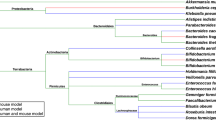Abstract
The impact of immune checkpoint molecule inhibitors on cancer treatment is significant. At the same time, further improvement in their efficacy has become essential. For this reason, there has been increasing interest in investigating the state of the cancer microenvironment in which efficacy can be demonstrated. The gut microbiota plays an important role in the cancer microenvironment. Recent developments in the study of gut microbiota have been explosive, benefiting from technological innovations in next-generation sequencing. Gut microbiota are specific enough to identify an individual and change gently with age. Disruptions in the gut microbiota have been extensively studied in relation to a variety of diseases. In addition to monotherapy with anti-PD-1/PD-L1 antibodies, combination therapy with chemotherapy and molecular target therapy, as well as combination therapy with anti-PD-1 and anti-CTLA-4 antibodies, is now widely used in cancer treatment with immune checkpoint inhibitors. Therefore, the development of biomarkers that can predict anti-tumor and adverse events is urgently required due to the complexity of the treatment, and research on gut microbiota is expected in this respect.




Similar content being viewed by others
References
Cani PD (2017) Gut microbiota-at the intersection of everything? Nat Rev Gastroenterol Hepatol 14:321–322. https://doi.org/10.1038/nrgastro.2017.54
Arboleya S et al (2012) Establishment and development of intestinal microbiota in preterm neonates. FEMS Microbiol Ecol 79:763–772. https://doi.org/10.1111/j.1574-6941.2011.01261.x
Backhed F et al (2015) Dynamics and stabilization of the human gut microbiome during the first year of life. Cell Host Microbe 17:852. https://doi.org/10.1016/j.chom.2015.05.012
Gopalakrishnan V et al (2018) Gut microbiome modulates response to anti-PD-1 immunotherapy in melanoma patients. Science 359:97–103. https://doi.org/10.1126/science.aan4236
Routy B et al (2018) Gut microbiome influences efficacy of PD-1-based immunotherapy against epithelial tumors. Science 359:91–97. https://doi.org/10.1126/science.aan3706
Gevers D et al (2014) The treatment-naive microbiome in new-onset Crohn’s disease. Cell Host Microbe 15:382–392. https://doi.org/10.1016/j.chom.2014.02.005
Ahn J et al (2013) Human gut microbiome and risk for colorectal cancer. J Natl Cancer Inst 105:1907–1911. https://doi.org/10.1093/jnci/djt300
Lepage P et al (2011) Twin study indicates loss of interaction between microbiota and mucosa of patients with ulcerative colitis. Gastroenterology 141:227–236. https://doi.org/10.1053/j.gastro.2011.04.011
Matson V et al (2018) The commensal microbiome is associated with anti-PD-1 efficacy in metastatic melanoma patients. Science 359:104–108. https://doi.org/10.1126/science.aao3290
Dubin K et al (2016) Intestinal microbiome analyses identify melanoma patients at risk for checkpoint-blockade-induced colitis. Nat Commun 7:10391. https://doi.org/10.1038/ncomms10391
Mao J, Wang D, Long J et al (2021) Gut microbiome is associated with the clinical response to anti-PD-1 based immunotherapy in hepatobiliary cancers. J Immunother Cancer. https://doi.org/10.1136/jitc-2021-003334
Ribas A (2012) Tumor immunotherapy directed at PD-1. N Engl J Med 366:2517–2519. https://doi.org/10.1056/NEJMe1205943
Qureshi OS et al (2011) Trans-endocytosis of CD80 and CD86: a molecular basis for the cell-extrinsic function of CTLA-4. Science 332:600–603. https://doi.org/10.1126/science.1202947
Soskic B, Qureshi OS, Hou T et al (2014) A transendocytosis perspective on the CD28/CTLA-4 pathway. Adv Immunol 124:95–136. https://doi.org/10.1016/B978-0-12-800147-9.00004-2
Vetizou M et al (2015) Anticancer immunotherapy by CTLA-4 blockade relies on the gut microbiota. Science 350:1079–1084. https://doi.org/10.1126/science.aad1329
Sivan A et al (2015) Commensal Bifidobacterium promotes antitumor immunity and facilitates anti-PD-L1 efficacy. Science 350:1084–1089. https://doi.org/10.1126/science.aac4255
Wang Y et al (2018) Fecal microbiota transplantation for refractory immune checkpoint inhibitor-associated colitis. Nat Med 24:1804–1808. https://doi.org/10.1038/s41591-018-0238-9
Schwabe RF, Jobin C (2013) The microbiome and cancer. Nat Rev Cancer 13:800–812. https://doi.org/10.1038/nrc3610
Derosa L et al (2018) Negative association of antibiotics on clinical activity of immune checkpoint inhibitors in patients with advanced renal cell and non-small-cell lung cancer. Ann Oncol 29:1437–1444. https://doi.org/10.1093/annonc/mdy103
Hamada K et al (2021) Antibiotic usage reduced overall survival by over 70% in non-small cell lung cancer patients on anti-PD-1 immunotherapy. Anticancer Res 41:4985–4993. https://doi.org/10.21873/anticanres.15312
Sun M, Wu W, Liu Z et al (2017) Microbiota metabolite short chain fatty acids, GPCR, and inflammatory bowel diseases. J Gastroenterol 52:1–8. https://doi.org/10.1007/s00535-016-1242-9
Skelly AN, Sato Y, Kearney S et al (2019) Mining the microbiota for microbial and metabolite-based immunotherapies. Nat Rev Immunol 19:305–323. https://doi.org/10.1038/s41577-019-0144-5
Coutzac C et al (2020) Systemic short chain fatty acids limit antitumor effect of CTLA-4 blockade in hosts with cancer. Nat Commun 11:2168. https://doi.org/10.1038/s41467-020-16079-x
Reck M, Ciuleanu TE, Cobo M et al (2021) First-line nivolumab plus ipilimumab with two cycles of chemotherapy versus chemotherapy alone (four cycles) in advanced non-small-cell lung cancer: CheckMate 9LA 2 year update. ESMO Open 6:100273
Sakai K, Sakurai T, De Velasco MA et al (2021) Intestinal microbiota and gene expression reveal similarity and dissimilarity between immune-mediated colitis and ulcerative colitis. Front Oncol 11:763468
Davar D et al (2021) Fecal microbiota transplant overcomes resistance to anti-PD-1 therapy in melanoma patients. Science 371:595–602. https://doi.org/10.1126/science.abf3363
Baruch et al (2021) Fecal microbiota transplant promotes response in immunotherapy refractory melanoma patients. Science 371:602–609
Acknowledgements
We would like to thank Editage (www.editage.com) for English language editing.
Author information
Authors and Affiliations
Corresponding author
Additional information
Publisher's Note
Springer Nature remains neutral with regard to jurisdictional claims in published maps and institutional affiliations.
About this article
Cite this article
Yoshimura, K. Association of microbiota with cancer treatment. Int J Clin Oncol 28, 341–346 (2023). https://doi.org/10.1007/s10147-023-02302-4
Received:
Accepted:
Published:
Issue Date:
DOI: https://doi.org/10.1007/s10147-023-02302-4



